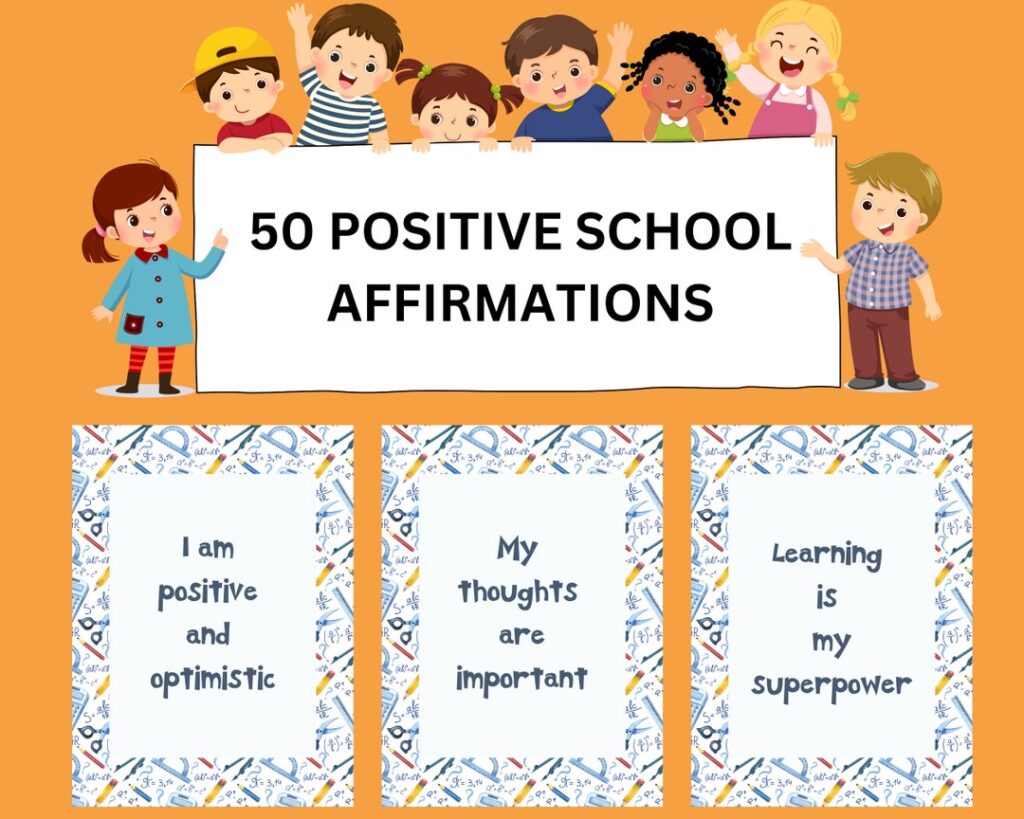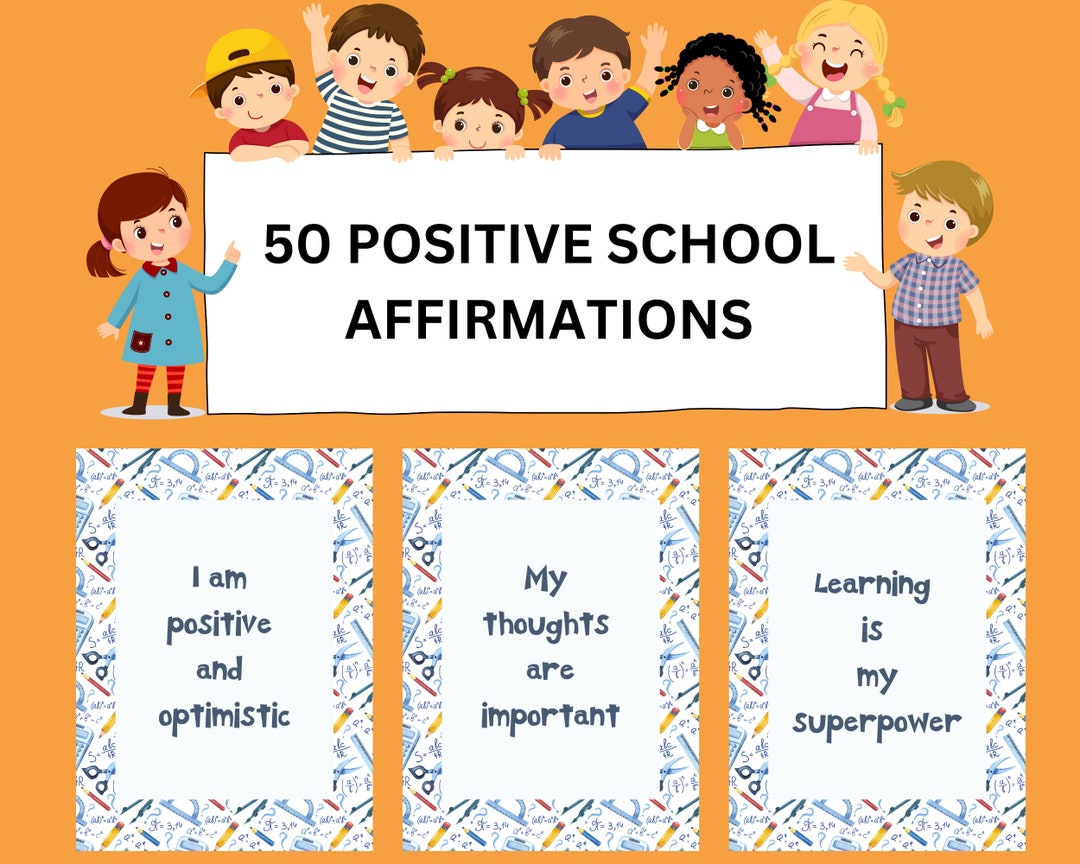
Empowering Minds: The Power of School Affirmations for Student Success
In the bustling environment of schools, where students navigate academic pressures, social dynamics, and personal growth, the importance of mental well-being cannot be overstated. Among the tools available to foster a positive mindset, school affirmations stand out as a simple yet powerful technique. These positive statements, repeated regularly, can significantly impact a student’s self-esteem, motivation, and overall academic performance. This article explores the profound effects of incorporating school affirmations into the daily lives of students and educators, highlighting their benefits and providing practical guidance on their effective implementation.
Understanding the Essence of School Affirmations
School affirmations are positive statements specifically designed to reinforce positive beliefs and attitudes within the educational setting. Unlike generic affirmations, these are tailored to address the unique challenges and opportunities students face. They can focus on academic abilities, social skills, personal qualities, and overall well-being. For example, affirmations like “I am a capable learner,” “I contribute positively to my class,” or “I am resilient in the face of challenges” can cultivate a growth mindset and foster a sense of self-efficacy.
The underlying principle behind school affirmations lies in the power of suggestion and the plasticity of the brain. By consistently repeating positive statements, students can gradually reprogram their subconscious minds, replacing negative self-talk with empowering beliefs. This process, known as neuroplasticity, allows the brain to form new neural pathways, reinforcing positive thought patterns and behaviors. Ultimately, this leads to improved self-confidence, reduced anxiety, and enhanced academic performance. [See also: Benefits of Positive Thinking in Education]
The Multifaceted Benefits of School Affirmations
The benefits of incorporating school affirmations extend far beyond academic achievement. They contribute to a holistic approach to education, nurturing the emotional, social, and psychological well-being of students. Here are some key advantages:
Boosting Self-Esteem and Confidence
School affirmations can significantly enhance a student’s self-esteem by directly addressing negative self-perceptions. By regularly affirming their strengths and capabilities, students develop a stronger sense of self-worth. This, in turn, translates into increased confidence in their academic abilities and social interactions. Students who believe in themselves are more likely to take risks, participate actively in class, and persevere through challenges.
Reducing Anxiety and Stress
The academic environment can be a source of significant stress and anxiety for many students. School affirmations provide a coping mechanism for managing these emotions. By focusing on positive outcomes and personal strengths, students can reduce feelings of overwhelm and anxiety. Affirmations like “I am calm and focused during tests” or “I can handle challenges with grace” can help students approach stressful situations with a more positive and resilient mindset. [See also: Stress Management Techniques for Students]
Enhancing Motivation and Goal-Setting
School affirmations can also serve as powerful motivators, inspiring students to set and achieve their goals. By consistently affirming their ability to succeed, students develop a stronger sense of purpose and determination. Affirmations like “I am motivated to learn and grow” or “I am committed to achieving my goals” can fuel their ambition and drive them to overcome obstacles. Furthermore, affirmations can help students visualize success, making their goals feel more attainable and within reach.
Improving Academic Performance
The cumulative effect of increased self-esteem, reduced anxiety, and enhanced motivation directly translates into improved academic performance. Students who believe in their abilities, manage their stress effectively, and are motivated to learn are more likely to excel in their studies. School affirmations can help students focus their attention, improve their concentration, and retain information more effectively. By fostering a positive learning environment, affirmations contribute to a more engaged and productive classroom experience. Affirmations can be a great tool for academic success.
Fostering a Positive School Climate
The benefits of school affirmations extend beyond individual students, contributing to a more positive and supportive school climate. When students feel valued, respected, and empowered, they are more likely to engage in positive behaviors and contribute to a sense of community. Affirmations that promote kindness, empathy, and respect can foster a culture of inclusivity and understanding. By creating a more positive and supportive environment, schools can cultivate a sense of belonging and well-being for all students.
Implementing School Affirmations Effectively
While the concept of school affirmations is simple, their effective implementation requires careful planning and consideration. Here are some practical guidelines for incorporating affirmations into the daily lives of students:
Tailoring Affirmations to Specific Needs
The most effective school affirmations are those that are tailored to the specific needs and challenges of individual students. Encourage students to identify their areas of weakness or insecurity and develop affirmations that directly address these issues. For example, a student struggling with math might create affirmations like “I am capable of understanding math concepts” or “I am improving my math skills every day.” Personalizing affirmations makes them more relevant and impactful.
Consistency is Key
The power of school affirmations lies in their consistent repetition. Encourage students to recite their affirmations regularly, ideally multiple times a day. The best times to practice affirmations are in the morning, before bedtime, or during moments of stress or anxiety. Regular repetition reinforces positive beliefs and helps to reprogram the subconscious mind. Making affirmations a daily habit is crucial for achieving lasting results. A consistent use of school affirmations can be life-changing.
Visualization Techniques
Combining school affirmations with visualization techniques can further enhance their effectiveness. Encourage students to visualize themselves succeeding in their academic pursuits or overcoming challenges. By mentally rehearsing positive outcomes, students strengthen their belief in their abilities and increase their likelihood of success. Visualization can be done in conjunction with reciting affirmations or as a separate practice. For example, a student might visualize themselves confidently presenting a project or acing a test.
Creating a Supportive Environment
The effectiveness of school affirmations is amplified when they are implemented within a supportive and encouraging environment. Educators, parents, and peers can play a crucial role in reinforcing positive beliefs and attitudes. Teachers can incorporate affirmations into their lessons, provide positive feedback, and create a classroom culture that celebrates effort and achievement. Parents can encourage their children to practice affirmations and provide ongoing support and encouragement. A collaborative approach ensures that students feel valued and empowered. The overall school environment should be one that supports school affirmations.
Leading by Example
Educators can also benefit from practicing school affirmations themselves. By modeling positive self-talk and demonstrating resilience in the face of challenges, teachers can inspire their students to do the same. When students see their teachers practicing what they preach, they are more likely to embrace affirmations as a valuable tool for personal growth. Furthermore, teachers who practice affirmations are better equipped to create a positive and supportive classroom environment. Remember that school affirmations are not just for students.
Using Affirmations in the Classroom
There are several ways to integrate school affirmations into the classroom setting. Teachers can begin each day with a class-wide affirmation, write affirmations on the board or display them as posters, or incorporate affirmations into mindfulness exercises. Group activities can also be used to encourage students to share their affirmations and support each other. By making affirmations a regular part of the classroom routine, teachers can create a more positive and empowering learning environment.
Examples of Effective School Affirmations
Here are some examples of effective school affirmations that can be adapted to suit the specific needs of students:
- I am intelligent and capable of learning.
- I am confident in my abilities.
- I am resilient and can overcome challenges.
- I am a valuable member of my class.
- I am focused and attentive in class.
- I am motivated to achieve my goals.
- I am kind and respectful to others.
- I am grateful for the opportunity to learn.
- I am proud of my accomplishments.
- I am growing and improving every day.
Students can also create their own personalized affirmations that reflect their unique strengths and aspirations.
The Science Behind Affirmations
While the benefits of school affirmations are often anecdotal, there is growing scientific evidence to support their effectiveness. Studies have shown that practicing affirmations can activate the reward centers in the brain, leading to increased feelings of happiness and well-being. Affirmations can also reduce activity in the amygdala, the brain region associated with fear and anxiety. Furthermore, research suggests that affirmations can improve problem-solving abilities and enhance cognitive performance. The science behind affirmations is becoming increasingly compelling.
Conclusion: Embracing the Power of Positive Self-Talk
In conclusion, school affirmations are a powerful tool for fostering student success and well-being. By consistently repeating positive statements, students can reprogram their subconscious minds, boost their self-esteem, reduce anxiety, enhance motivation, and improve their academic performance. When implemented effectively within a supportive environment, school affirmations can contribute to a more positive and empowering school climate. As educators and parents, we have a responsibility to equip our students with the tools they need to thrive, and school affirmations are a simple yet profound way to empower young minds and unlock their full potential. Consider incorporating school affirmations into your daily routine to experience the transformative power of positive self-talk. The benefits are undeniable. By using school affirmations, students can truly change their lives. These powerful statements can help them unlock their full potential and achieve their academic goals. Remember, the key is consistency and belief in the power of positive thinking. With regular practice, school affirmations can become a valuable tool for success in school and beyond.

